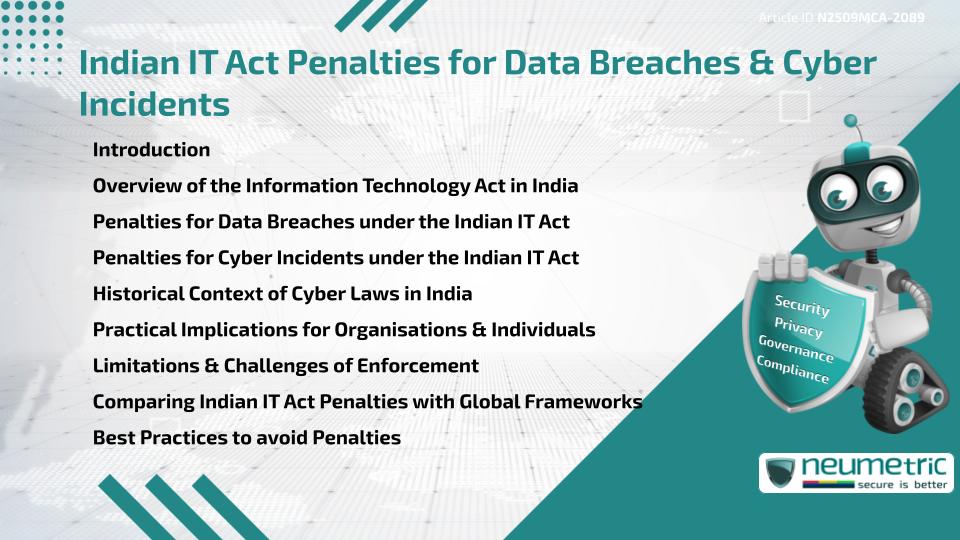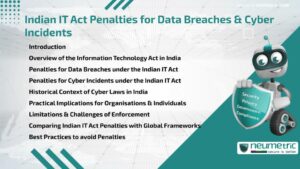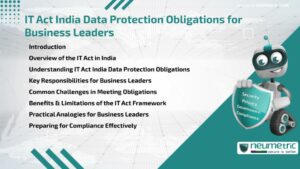Table of Contents
ToggleIntroduction
The Indian IT Act penalties for Data Breaches & Cyber Incidents are defined under the Information Technology Act, 2000, a cornerstone of India’s cyber law Framework. The Act sets rules for Data Protection, Electronic Records & Legal recognition of digital transactions while prescribing strict penalties for violations. These include fines, imprisonment & compensation liabilities for affected individuals or Organisations. Understanding these penalties is essential for companies, service providers & individuals handling Personal or Sensitive Information in India.
Overview of the Information Technology Act in India
The Information Technology Act, 2000 was introduced to promote electronic Governance, facilitate digital transactions & provide legal safeguards against cybercrime. It was amended in 2008 to address rising concerns around Cyber Threats, Data Protection & unauthorised access. The Act grants legal recognition to digital signatures, ensures data confidentiality & penalises individuals or Organisations for negligent handling of information.
Penalties for Data Breaches under the Indian IT Act
Section 43A of the IT Act makes companies liable if they fail to protect sensitive Personal Data & cause wrongful loss or gain. Organisations may have to pay compensation to the affected parties. The penalties can amount to several lakh rupees depending on the severity of the breach. For instance, failure to implement reasonable security practices like encryption or firewalls can invite these penalties. The law highlights that both intent & negligence are considered while deciding liability.
Penalties for Cyber Incidents under the Indian IT Act
The Indian IT Act penalties for Data Breaches are closely related to penalties for broader Cyber Incidents. Section 66 covers hacking, identity theft & fraudulent use of electronic resources. Penalties under this section include imprisonment up to three (3) years & fines up to five (5) lakh rupees. Cyber terrorism, under Section 66F, carries more severe consequences, including imprisonment for life. These provisions show how the law scales penalties depending on the seriousness of the incident.
Historical Context of Cyber Laws in India
When the IT Act was first introduced in 2000, India had just begun digitising its services. At that time, the primary aim was to regulate e-commerce & online contracts. Over the years, increasing cases of cyber fraud, hacking & large-scale data theft prompted amendments in 2008. These updates included specific provisions for Data Breaches, Privacy violations & Cyber Terrorism. The evolution of the Act mirrors India’s digital transformation journey.
Practical Implications for Organisations & Individuals
For businesses, the Indian IT Act penalties for Data Breaches mean they must adopt strong Cybersecurity frameworks. regular Audits, Data classification Policies & Employee Awareness programs are essential to avoid liabilities. For individuals, negligence in protecting access credentials or involvement in hacking attempts can lead to imprisonment or fines. Even small Organisations are not exempt, as the law applies uniformly across all entities handling Sensitive Information.
Limitations & Challenges of Enforcement
Despite strong legal provisions, enforcing penalties under the IT Act has challenges. Many Cyber Incidents go unreported due to lack of awareness or fear of reputational damage. Jurisdictional issues also arise in cases where attacks originate from outside India. Additionally, proving negligence in court can be difficult without Technical expertise & forensic Evidence. These limitations reduce the deterrent effect of the law in certain cases.
Comparing Indian IT Act Penalties with Global Frameworks
When compared to frameworks like the European Union’s General Data Protection Regulation [GDPR], Indian IT Act penalties for Data Breaches appear less stringent in monetary terms. GDPR allows fines up to 4% of annual global turnover, while Indian penalties are capped at lower amounts. However, imprisonment provisions in India make its approach uniquely strict in a criminal sense. The contrast highlights the different regulatory philosophies followed across jurisdictions.
Best Practices to avoid Penalties
Organisations can safeguard themselves from penalties by:
- Implementing ISO-certified security standards
- Conducting regular Risk Assessments
- Maintaining strong Access Controls
- Encrypting Sensitive Information
- Training staff on Cyber Hygiene
Individuals can avoid liability by ensuring safe browsing, avoiding unauthorised access & securing passwords. These practices not only reduce the Risk of breaches but also ensure Compliance with the IT Act.
Takeaways
- The Indian IT Act penalties for data breachs cover both negligence & intentional acts.
- Penalties include fines, compensation & imprisonment.
- Amendments in 2008 expanded the scope of the Act to cover modern Cyber Threats.
- Enforcement faces challenges due to jurisdictional & technical barriers.
- Organisations must adopt Best Practices to avoid liabilities under the Act.
FAQ
What are the main sections dealing with Indian IT Act penalties for data breachs?
Sections 43A & 66 of the IT Act specifically deal with compensation & imprisonment for Data Breaches & cybercrimes.
Can individuals also be punished under the IT Act?
Yes, individuals can face imprisonment & fines for hacking, identity theft or negligence leading to Data Breaches.
How does the IT Act define sensitive Personal Data?
Sensitive Data includes information like passwords, Financial records, medical records & biometric details.
Are foreign companies operating in India also liable?
Yes, any company handling data of Indian citizens is liable under the IT Act, regardless of its origin.
How do Indian IT Act penalties for data breachs differ from GDPR penalties?
GDPR imposes higher Financial fines, while the IT Act combines moderate Financial penalties with criminal provisions like imprisonment.
What role does intent play in deciding penalties?
Both negligence & malicious intent are considered when deciding penalties under the IT Act.
Can victims of Data Breaches claim compensation?
Yes, affected individuals can seek compensation through adjudicating officers or civil courts.
Need help for Security, Privacy, Governance & VAPT?
Neumetric provides organisations the necessary help to achieve their Cybersecurity, Compliance, Governance, Privacy, Certifications & Pentesting needs.
Organisations & Businesses, specifically those which provide SaaS & AI Solutions in the Fintech, BFSI & other regulated sectors, usually need a Cybersecurity Partner for meeting & maintaining the ongoing Security & Privacy needs & requirements of their Enterprise Clients & Privacy conscious Customers.
SOC 2, ISO 27001, ISO 42001, NIST, HIPAA, HECVAT, EU GDPR are some of the Frameworks that are served by Fusion – a SaaS, multimodular, multitenant, centralised, automated, Cybersecurity & Compliance Management system.
Neumetric also provides Expert Services for technical security which covers VAPT for Web Applications, APIs, iOS & Android Mobile Apps, Security Testing for AWS & other Cloud Environments & Cloud Infrastructure & other similar scopes.
Reach out to us by Email or filling out the Contact Form…





